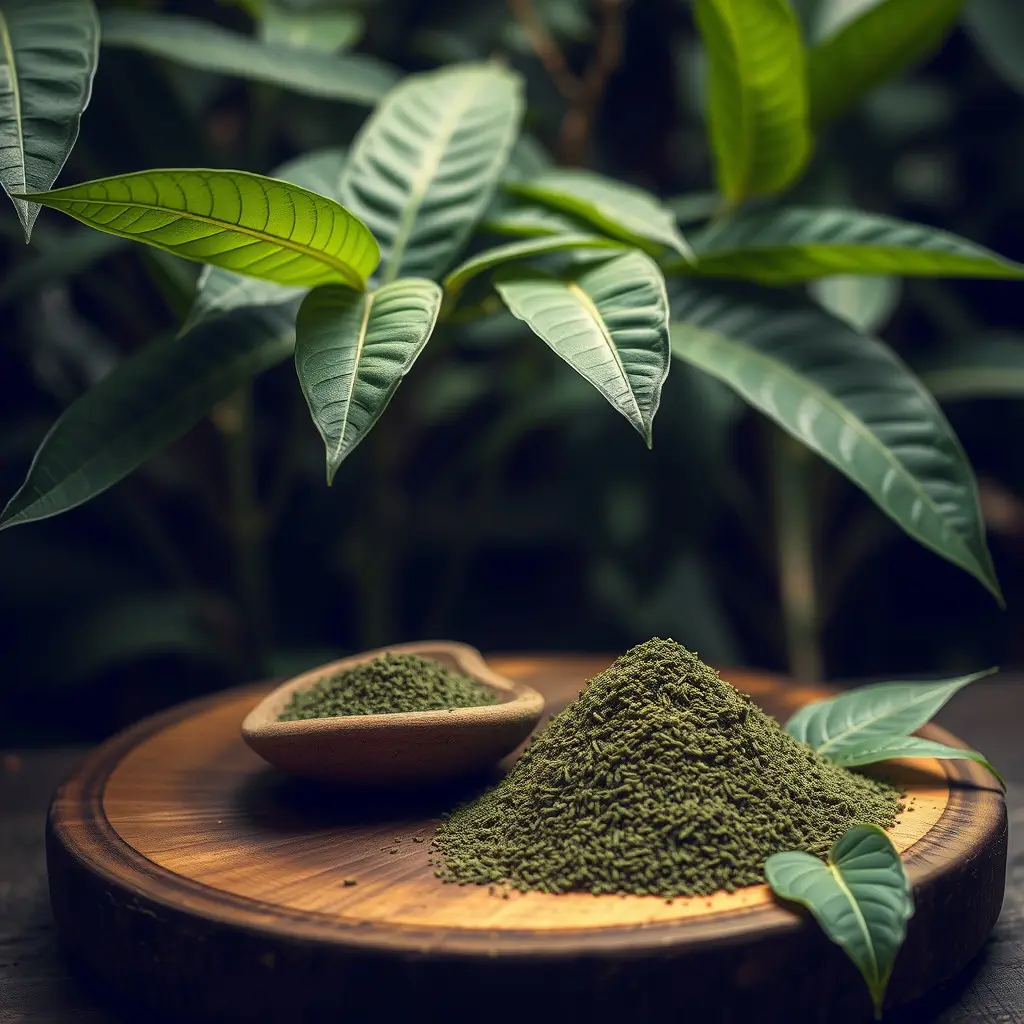Kratom, derived from Southeast Asia and known for its potential stress and anxiety relief properties due to compounds like mitragynine and 7-hydroxymitragynine, is a subject of interest as a natural alternative to traditional pharmaceuticals. Its legal status in the United States varies by state, with a complex situation in Texas: while federally unregulated by the DEA, within Texas, it is categorized as a dietary supplement with certain restrictions, such as not containing specific controlled substances. Local ordinances can further impact its availability; for example, San Antonio has banned kratom sales. Therefore, it's crucial for individuals to verify the current legality of kratom in their immediate area within Texas before using or purchasing it. Safety considerations include starting with low doses and consulting healthcare professionals due to potential interactions with other substances or medical conditions. Additionally, a balanced lifestyle that includes proper nutrition, exercise, and sleep can complement the effects of kratom. Proper storage is also recommended to ensure safety, especially for households with children and pets. As laws are subject to change, staying informed about legal status updates is advisable for anyone considering kratom as part of their wellness routine in Texas.
Exploring the intersection of natural remedies and mental well-being, this article delves into the potential of kratom as a stress and anxiety mitigator. With a focus on understanding kratom’s role in managing these conditions, we will navigate its legal standing in Texas—addressing “is kratom legal in Texas?” with clarity. Furthermore, we provide essential guidance on safe usage practices to harness the benefits of kratom effectively and responsibly. This insightful exploration aims to empower readers with knowledge for informed decision-making in their pursuit of calm and composure.
- Understanding Kratom's Role in Stress and Anxiety Management: A Brief Overview
- The Legal Status of Kratom in Texas: Navigating State Regulations
- Safe Kratom Usage for Reducing Stress and Anxiety: Guidance and Best Practices
Understanding Kratom's Role in Stress and Anxiety Management: A Brief Overview

Kratom, a plant originating from Southeast Asia, has garnered attention for its potential role in managing stress and anxiety. The active compounds found in kratom leaves, mitragynine and 7-hydroxymitragynine, interact with the brain’s opioid receptors, which can influence mood and pain perception. As individuals seek natural alternatives to traditional pharmaceuticals for stress and anxiety relief, kratom has emerged as a subject of interest. It is important for consumers to understand both the purported benefits and the regulatory status of kratom in their jurisdiction before incorporating it into their wellness routine. For example, the legal status of kratom varies by state within the United States. As of the knowledge cutoff in 2023, is kratom legal in Texas? Yes, kratom is legal in Texas, provided it does not contain more than trace amounts of certain controlled substances as defined by state law. Users should ensure that any kratom product they purchase complies with these regulations to avoid legal repercussions.
When considering kratom for stress and anxiety management, it is crucial to approach its use with caution and informed decision-making. Research suggests that certain strains of kratom may provide calming effects or help alleviate symptoms of anxiety, while others might offer a stimulating effect, which could be beneficial for individuals experiencing fatigue-related stress. However, the scientific evidence supporting these claims is still evolving, and more research is needed to fully understand kratom’s efficacy and safety profile in this context. Users should also be aware that kratom can interact with other medications and may have side effects. It is always recommended to consult with a healthcare professional before introducing kratom into one’s health regimen, particularly for individuals managing stress and anxiety who may be taking other medications or dealing with underlying health conditions.
The Legal Status of Kratom in Texas: Navigating State Regulations

Kratom, a plant native to Southeast Asia, has gained attention for its potential effects on mood and energy levels. As interest in kratom grows, so does the need for clarity on its legal status, particularly within the state of Texas. In Texas, the legal standing of kratom is subject to evolving regulations. At the federal level, the Drug Enforcement Administration (DEA) has not classified kratom as a controlled substance, which means it is currently legally available. However, state and local laws can differ significantly.
Texas law regards kratom as a supplement rather than a controlled substance, allowing its sale and consumption within the state boundaries. Nevertheless, specific cities or counties may have ordinances that restrict or regulate kratom more stringently. For instance, San Antonio has banned the sale of kratom, while other municipalities may have their own regulations. It’s crucial for individuals to be aware of local laws if considering the use of kratom, as legal status can change and varies across different regions within Texas. Consumers should always verify the most current local legislation before purchasing or using kratom products. Keeping abreast of these changes is essential for anyone seeking to use kratom legally in Texas.
Safe Kratom Usage for Reducing Stress and Anxiety: Guidance and Best Practices

Mitigating stress and anxiety through natural means has become increasingly popular, with many individuals exploring alternative remedies such as kratom. Kratom, a tropical evergreen tree native to Southeast Asia, has garnered attention for its potential therapeutic properties. When considering kratom for stress and anxiety reduction, it’s crucial to understand safe usage practices due to the complex legal status it holds across different regions, including Texas. As of the latest update, is kratom legal in Texas? The answer is nuanced; while federally kratom remains uncontrolled at the DEA level, individual states and counties may have varying regulations. In Texas, kratom is legal but subject to certain restrictions, such as prohibiting its sale as an herbal supplement or in combination with other stimulants.
To safely incorporate kratom into a regimen aimed at reducing stress and anxiety, adherence to best practices is paramount. Users should start with low doses to gauge individual sensitivity and avoid the risk of adverse effects. It’s also important to consult with a healthcare provider before incorporating kratom into any health regimen, given its interactions with other substances or existing medical conditions. Additionally, maintaining a balanced lifestyle, including regular exercise, a healthy diet, and adequate sleep, complements kratom’s potential benefits. Storage of kratom should be in a secure, cool, and dry place, away from children and pets. Regularly reviewing the legal status of kratom in Texas is also advised, as legislation can change. By following these guidelines, individuals seeking natural alternatives for stress and anxiety management may find kratom to be a beneficial addition to their wellness toolkit, provided it is legally permissible within their jurisdiction.
In conclusion, kratom presents a potentially valuable avenue for individuals seeking to manage stress and anxiety, with its role in these areas receiving growing attention. Texas residents curious about the legality of kratom should be aware of the specific laws within their jurisdiction, as the legal status of kratom in Texas requires careful navigation. For those considering the use of kratom for stress and anxiety relief, it is crucial to approach its consumption responsibly and adhere to best practices to ensure safety and efficacy. As with any wellness strategy, individual experiences may vary, and personal consultation with healthcare professionals is always recommended. By understanding both the legal framework and responsible usage guidelines, individuals in Texas can make informed decisions about incorporating kratom into their stress and anxiety management routines.






